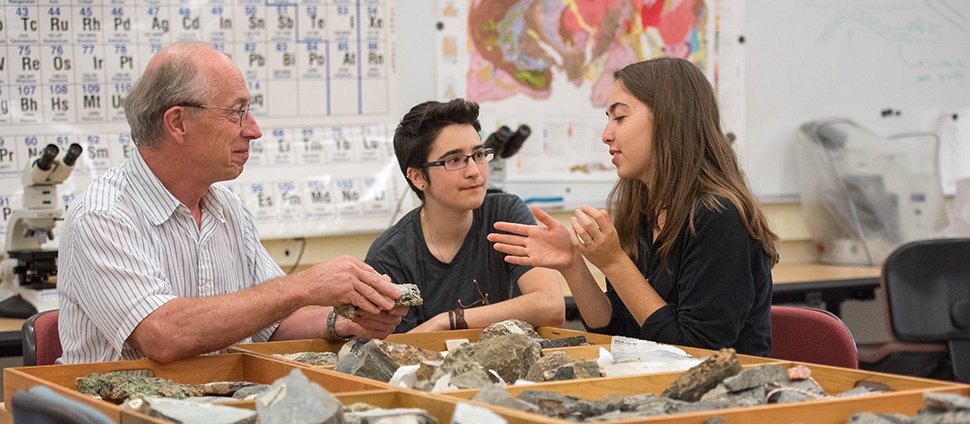Document Type
Article
Publication Date
2004
Publication Title
Geological Society of America
Abstract
Measurements of 60 single-grain, UV laser microprobe 40Ar/39Ar total gas ages for hornblende from metamorphic rocks of the Tobacco Root Mountains in southwest Montana yield a mean age of 1.71 ± 0.02 Ga. Measurements of 40Ar/39Ar step-heating plateau ages of three bulk hornblende samples from the Tobacco Root Mountains metamorphic rocks average 1.70 ± 0.02 Ga. We believe that these and the K/Ar or 40Ar/39Ar ages reported by previous workers are cooling ages from a 1.78 to 1.72 Ga, upper-amphibolite to granulite facies, regional metamorphism (Big Sky orogeny) that affected the northwestern portion of the Wyoming province, including the Tobacco Root Mountains and adjacent ranges. Based on the 40Ar/39Ar data, this 1.78–1.72 Ga metamorphism must have achieved temperatures greater than ~500 °C to reset the hornblende 40Ar/39Ar ages of samples from the Indian Creek Metamorphic Suite, which was previously metamorphosed at 2.45 Ga, and of the crosscutting metamorphosed mafic dikes and sills (MMDS), which were intruded at 2.06 Ga. Biotite and hornblende from the Tobacco Root Mountains appear to give the same 40Ar/39Ar or K/Ar age (within uncertainty), indicating that the rocks cooled rapidly through the interval from 500 to 300 °C. This is consistent with a model of the Big Sky orogeny that includes late-stage tectonic denudation that leads to decompression and rapid cooling. A similar cooling history is suggested by our data for the Ruby Range. Three biotite samples from the Ruby Range yield 40Ar/39Ar step-heating plateau ages with a mean of 1.73 ± 0.02 Ga, identical to the best-estimate (near-plateau) age for a hornblende from the same rocks. Two samples of the orthoamphibole, gedrite, from the Tobacco Root Mountains were studied, but did not have enough K to yield a reliable 40Ar/39Ar age. Several biotite and three hornblende samples from the region yield 40Ar/39Ar dates significantly younger than 1.7 Ga. We believe these samples were partially reset during contact metamorphism by Cretaceous (75 Ma) intrusive rocks. Hydrothermal alteration associated with ca. 1.4 Ga rifting led to growth of muscovite with that age in the Ruby Range, but this alteration was apparently not hot enough to reset biotite and hornblende ages there.
Keywords
Wyoming province, Big Sky orogeny, Proterozoic era
First Page
131
Last Page
149
Rights
© 2004 Geological Society of America
Version
Author's Accepted Manuscript
Recommended Citation
Brady, John B.; Kovaric, Dana N.; Cheney, John T.; Jacob, Lisa J.; and King, J. Toby, "40Ar/ 39Ar Ages of Metamorphic Rocks from the Tobacco Root Mountains Region, Montana" (2004). Geosciences: Faculty Publications, Smith College, Northampton, MA.
https://scholarworks.smith.edu/geo_facpubs/32


